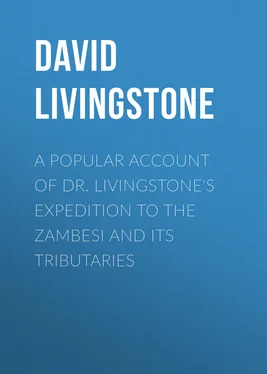David Livingstone - A Popular Account of Dr. Livingstone's Expedition to the Zambesi and Its Tributaries
Здесь есть возможность читать онлайн «David Livingstone - A Popular Account of Dr. Livingstone's Expedition to the Zambesi and Its Tributaries» — ознакомительный отрывок электронной книги совершенно бесплатно, а после прочтения отрывка купить полную версию. В некоторых случаях можно слушать аудио, скачать через торрент в формате fb2 и присутствует краткое содержание. Издательство: Иностранный паблик, Жанр: Путешествия и география, foreign_antique, foreign_prose, на английском языке. Описание произведения, (предисловие) а так же отзывы посетителей доступны на портале библиотеки ЛибКат.
- Название:A Popular Account of Dr. Livingstone's Expedition to the Zambesi and Its Tributaries
- Автор:
- Издательство:Иностранный паблик
- Жанр:
- Год:неизвестен
- ISBN:нет данных
- Рейтинг книги:4 / 5. Голосов: 1
-
Избранное:Добавить в избранное
- Отзывы:
-
Ваша оценка:
- 80
- 1
- 2
- 3
- 4
- 5
A Popular Account of Dr. Livingstone's Expedition to the Zambesi and Its Tributaries: краткое содержание, описание и аннотация
Предлагаем к чтению аннотацию, описание, краткое содержание или предисловие (зависит от того, что написал сам автор книги «A Popular Account of Dr. Livingstone's Expedition to the Zambesi and Its Tributaries»). Если вы не нашли необходимую информацию о книге — напишите в комментариях, мы постараемся отыскать её.
A Popular Account of Dr. Livingstone's Expedition to the Zambesi and Its Tributaries — читать онлайн ознакомительный отрывок
Ниже представлен текст книги, разбитый по страницам. Система сохранения места последней прочитанной страницы, позволяет с удобством читать онлайн бесплатно книгу «A Popular Account of Dr. Livingstone's Expedition to the Zambesi and Its Tributaries», без необходимости каждый раз заново искать на чём Вы остановились. Поставьте закладку, и сможете в любой момент перейти на страницу, на которой закончили чтение.
Интервал:
Закладка:
Conspicuous among the trees, for its gigantic size, and bark coloured exactly like Egyptian syenite, is the burly Baobab. It often makes the other trees of the forest look like mere bushes in comparison. A hollow one, already mentioned, is 74 feet in circumference, another was 84, and some have been found on the West Coast which measure 100 feet. The lofty range of Kebrabasa, consisting chiefly of conical hills, covered with scraggy trees, crosses the Zambesi, and confines it within a narrow, rough, and rocky dell of about a quarter of a mile in breadth; over this, which may be called the flood-bed of the river, large masses of rock are huddled in indescribable confusion. The drawing, for the use of which, and of others, our thanks are due to Lord Russell, conveys but a faint idea of the scene, inasmuch as the hills which confine the river do not appear in the sketch. The chief rock is syenite, some portions of which have a beautiful blue tinge like lapis lazuli diffused through them; others are grey. Blocks of granite also abound, of a pinkish tinge; and these with metamorphic rocks, contorted, twisted, and thrown into every conceivable position, afford a picture of dislocation or unconformability which would gladden a geological lecturer’s heart; but at high flood this rough channel is all smoothed over, and it then conforms well with the river below it, which is half a mile wide. In the dry season the stream runs at the bottom of a narrow and deep groove, whose sides are polished and fluted by the boiling action of the water in flood, like the rims of ancient Eastern wells by the draw-ropes. The breadth of the groove is often not more than from forty to sixty yards, and it has some sharp turnings, double channels, and little cataracts in it. As we steamed up, the masts of the “Ma Robert,” though some thirty feet high, did not reach the level of the flood-channel above, and the man in the chains sung out, “No bottom at ten fathoms.” Huge pot-holes, as large as draw-wells, had been worn in the sides, and were so deep that in some instances, when protected from the sun by overhanging boulders, the water in them was quite cool. Some of these holes had been worn right through, and only the side next the rock remained; while the sides of the groove of the flood-channel were polished as smooth as if they had gone through the granite-mills of Aberdeen. The pressure of the water must be enormous to produce this polish. It had wedged round pebbles into chinks and crannies of the rocks so firmly that, though they looked quite loose, they could not be moved except with a hammer. The mighty power of the water here seen gave us an idea of what is going on in thousands of cataracts in the world. All the information we had been able to obtain from our Portuguese friends amounted to this, that some three or four detached rocks jutted out of the river in Kebrabasa, which, though dangerous to the cumbersome native canoes, could be easily passed by a steamer, and that if one or two of these obstructions were blasted away with gunpowder, no difficulty would hereafter be experienced. After we had painfully explored seven or eight miles of the rapid, we returned to the vessel satisfied that much greater labour was requisite for the mere examination of the cataracts than our friends supposed necessary to remove them; we therefore went down the river for fresh supplies, and made preparation for a more serious survey of this region.
The steamer having returned from the bar, we set out on the 22nd of November to examine the rapids of Kebrabasa. We reached the foot of the hills again, late in the afternoon of the 24th, and anchored in the stream. Canoe-men never sleep on the river, but always spend the night on shore. The natives on the right bank, in the country called Shidima, who are Banyai, and even at this short distance from Tette, independent, and accustomed to lord it over Portuguese traders, wondered what could be our object in remaining afloat, and were naturally suspicious at our departing from the universal custom.
They hailed us from the bank in the evening with “Why don’t you come and sleep onshore like other people?”
The answer they received from our Makololo, who now felt as independent as the Banyai, was, “We are held to the bottom with iron; you may see we are not like your Bazungu.”
This hint, a little amplified, saved us from the usual exactions. It is pleasant to give a present, but that pleasure the Banyai usually deny to strangers by making it a fine, and demanding it in such a supercilious way, that only a sorely cowed trader could bear it. They often refuse to touch what is offered—throw it down and leave it—sneer at the trader’s slaves, and refuse a passage until the tribute is raised to the utmost extent of his means.
Leaving the steamer next morning, we proceeded on foot, accompanied by a native Portuguese and his men and a dozen Makololo, who carried our baggage. The morning was pleasant, the hills on our right furnished for a time a delightful shade; but before long the path grew frightfully rough, and the hills no longer shielded us from the blazing sun. Scarcely a vestige of a track was now visible; and, indeed, had not our guide assured us to the contrary, we should have been innocent of even the suspicion of a way along the patches of soft yielding sand, and on the great rocks over which we so painfully clambered. These rocks have a singular appearance, from being dislocated and twisted in every direction, and covered with a thin black glaze, as if highly polished and coated with lamp-black varnish. This seems to have been deposited while the river was in flood, for it covers only those rocks which lie between the highest water-mark and a line about four feet above the lowest. Travellers who have visited the rapids of the Orinoco and the Congo say that the rocks there have a similar appearance, and it is attributed to some deposit from the water, formed only when the current is strong. This may account for it in part here, as it prevails only where the narrow river is confined between masses of rock, backed by high hills, and where the current in floods is known to be the strongest; and it does not exist where the rocks are only on one side, with a sandy beach opposite, and a broad expanse of river between. The hot rocks burnt the thick soles of our men’s feet, and sorely fatigued ourselves. Our first day’s march did not exceed four miles in a straight line, and that we found more than enough to be pleasant.
The state of insecurity in which the Badèma tribe live is indicated by the habit of hiding their provisions in the hills, and keeping only a small quantity in their huts; they strip a particular species of tree of its bitter bark, to which both mice and monkeys are known to have an antipathy, and, turning the bark inside out, sew it into cylindrical vessels for their grain, and bury them in holes and in crags on the wooded hill-sides. By this means, should a marauding party plunder their huts, they save a supply of corn. They “could give us no information, and they had no food; Chisaka’s men had robbed them a few weeks before.”
“Never mind,” said our native Portuguese, “they will sell you plenty when you return, they are afraid of you now, as yet they do not know who you are.” We slept under trees in the open air, and suffered no inconvenience from either mosquitoes or dew: and no prowling wild beast troubled us; though one evening, while we were here, a native sitting with some others on the opposite bank was killed by a leopard.
One of the Tette slaves, who wished to be considered a great traveller, gave us, as we sat by our evening fire, an interesting account of a strange race of men whom he had seen in the interior; they were only three feet high, and had horns growing out of their heads; they lived in a large town and had plenty of food. The Makololo pooh-poohed this story, and roundly told the narrator that he was telling a downright lie. “ We come from the interior,” cried out a tall fellow, measuring some six feet four, “are we dwarfs? have we horns on our heads?” and thus they laughed the fellow to scorn. But he still stoutly maintained that he had seen these little people, and had actually been in their town; thus making himself the hero of the traditional story, which before and since the time of Herodotus has, with curious persistency, clung to the native mind. The mere fact that such absurd notions are permanent, even in the entire absence of literature, invests the religious ideas of these people also with importance, as fragments of the wreck of the primitive faith floating down the stream of time.
Читать дальшеИнтервал:
Закладка:
Похожие книги на «A Popular Account of Dr. Livingstone's Expedition to the Zambesi and Its Tributaries»
Представляем Вашему вниманию похожие книги на «A Popular Account of Dr. Livingstone's Expedition to the Zambesi and Its Tributaries» списком для выбора. Мы отобрали схожую по названию и смыслу литературу в надежде предоставить читателям больше вариантов отыскать новые, интересные, ещё непрочитанные произведения.
Обсуждение, отзывы о книге «A Popular Account of Dr. Livingstone's Expedition to the Zambesi and Its Tributaries» и просто собственные мнения читателей. Оставьте ваши комментарии, напишите, что Вы думаете о произведении, его смысле или главных героях. Укажите что конкретно понравилось, а что нет, и почему Вы так считаете.












![Edward Ellis - Adrift on the Pacific - A Boys [sic] Story of the Sea and its Perils](/books/753342/edward-ellis-adrift-on-the-pacific-a-boys-sic-s-thumb.webp)